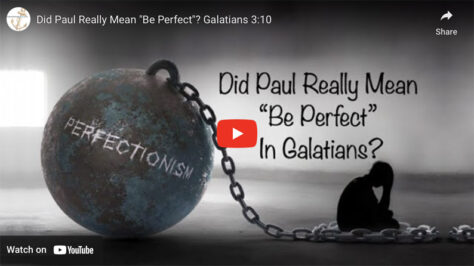Is the Bible a love letter to me? The answer is, yes and no. The Bible contains God’s spoken word, written for all people at all times. There is a message to each of us, on every page of the Bible, and it is given for learning, conviction, correction and instruction in righteousness (2 Timothy 3:16). From Genesis to Revelation, the Bible reveals Jesus as our Creator and our Christ, our Redeemer and our Restorer, our Saviour and our Sanctifier, our High Priest and our Hope, our Comfort and our Coming King. Without the Bible, our understanding of who Jesus is, what He has done for us and who we are in Him would be limited. The Bible reveals the mercy, grace, and loving-kindness of God, our need for a Saviour, God’s great love for us, and absolutely everything we need to know to live our earthly lives.
The Bible truly is a message of God’s amazing love, but is it a love letter written TO us?
While the Bible is clearly written FOR us, it can’t be said that every verse and passage is written TO us. The Bible must be understood as a record of progressive revelation of the Person and works of our Triune God. Much of the Bible is a historical account of actual events. It tells of real people who lived and died and ancient cities and the lives of the people. The Bible records the spoken word of God given through humans and written down for all ages. The Bible reveals God’s purpose and plan and His will in all things.
While the Bible does contain letters, it must be remembered that these letters were written to specific people (i.e. select churches, or people groups) and the content of the letters must be understood first in the historical context. There can be differences in what the letter said to the original recipient and in how it applies to all others who read it.
An Example
if you wrote a letter to your daughter at college and spoke of your love for her and gave instructions specific to an event in her life (let’s say, the importance of studying for a French final), it would be foolish for your daughter’s roommate to read the letter and assume you wrote it to her. It would also be illogical for the roommate to think that you love her in the same way you love your daughter and that you are instructing her to study for the French final (especially if she is taking Spanish).
This scenario is, of course, silly. However, the roommate could rightfully read the letter and think of what a loving and caring person you are. She might know you as a friend and think of how kind you are. She might also take the advice about studying and apply it to the importance of studying for her Spanish final. You get the idea. The letter was not written to your daughter’s roommate, but it could be beneficial for her when she reads it.
This illustration shows the importance of remembering to whom God’s words were originally spoken or written. Knowing where the people were at the time and what was going on in their world, and the world around them will help us more clearly understand God’s Word and develop a biblically sound and consistent hermeneutic.
Hermeneutics is the branch of theology that deals with the methods of interpreting Scripture to correctly understand God’s words. A historical/grammatical hermeneutic begins by considering the historical context and the grammatical communication of the time. Starting with this hermeneutic keeps the words in the proper context and avoids the error of making the words “say” something they do not.
Context, Context, Context
The Bible records many commands and promises that were given to Israel about their nation, their captivity, their relationship to God, etc. When those verses are taken out of context and applied to us in the age of the Holy Spirit, they can be made to say something that is not true for believers under the New Covenant. Old Testament commands and promises need to be understood by making a distinction about to whom, when, and under what circumstances, they were given. Then we can apply the principles in a way that is consistent with New Testament church doctrine.
An example of the necessity to understand historical/grammatical context would be God’s command not to eat shellfish (Leviticus 11:10). It was given to a specific people—the nation of Israel, at a specific time—following the setting up of the Tabernacle, prior to the nation leaving Sinai, and for a specific purpose. (The Bible is not clear why eating shellfish was prohibited. Many believe it was likely for health reasons.) Sadly, there are some today who neglect the historical context of the shellfish prohibition and wrongly apply it to Christians.
Back to our question. “Is the Bible a love letter from God to us?”
I personally believe that thinking of the Bible in that way is dangerous because it can promote reading the Bible looking for myself. My recommendation is that Christians read the Bible looking for Jesus and to learn more about Him and to understand His ways—in the historical context. The better we know Jesus, the more we will love Him and the clearer the application of biblical principles will be in our lives. We should look for Jesus on every page of the Bible and we will find the amazing love He has for us.
The Bible really is not about us. It’s all about Jesus. When we keep our eyes focused on Him and when we look upward to “the Author and Finisher of our Faith” (Hebrews 12:2), we can rest in His love and be fueled by His Spirit. Then we can look outward empowered by Jesus to love and serve our neighbor.
The inward focus on self is dangerous. If we look inward, and then we look outward, we must ask, from where does the power to love and serve our neighbor come? Let us never make reading the Bible about us. The power to love and serve others must come from God. We don’t want to look inward. We always want to keep looking up….
Looking for that blessed hope, and the glorious appearing of the great God and our Saviour Jesus Christ. Titus 2:13
<*}}}><
Read more about love:
- A-Z Proof of Love that Never Fades
- What are the 10 Ways We Can Love Like Jesus?
- You Ask Why I Follow This Jesus? -- a short poem
- Because He First Loved Us - 1 John 4:19
- Faith, Hope, and Love — Why is Love the Greatest?
- Testify to Love (VIDEO)
- Does a Wedding Ceremony Have Prophetic Typology of the Rapture?
- Extravagant Love that Captures our Hearts
- Fun Facts about Love
- Kids Say the Darndest Things (video)
- “The Five Love Languages” by God
- Do You Really Love Him?
- What Do Kids Say About Love?
- What’s Love Got to Do With It?
- What is Love?
- Is the Bible a love letter to me?
- Does God love the lost?
- Extravagant Love
- O Love That Will Not Let Me Go
- 24 Reasons “Why I Love America,” by John Wayne (video)
- The Legacy of Love — It’s Not Just For Fathers
- Mother’s Love
- Love Lifted Me
- True Love is Jesus (video)
- Won't You Be Mine (video)
- He Loves Me (video)
- Love One Another (video)
- True Love is Jesus (video)
- How Can I Understand the Love of God?
- Do You Have a Heart for God?
- A Heart for God Revealed in St. Patrick’s Prayer
- My Beloved is Mine and I am His
- Oh, To Love With a Pure Heart
- Love is. . .
- Is All Love Created Equal? CS Lewis Answers
- What Can Love Do? (video)
- What is Biblical Love?
*******
Jesus is the Reason this Ministry Exists
At Reasons for Hope* Jesus, we are committed to equipping, encouraging, and empowering Christians to know Jesus better, love Him more, and share their faith. We also reach the lost through our Salvation Page.
With your support, we can continue to provide valuable resources and engaging content. Please join us in our mission by donating today. Your generous contribution helps us expand our outreach of sharing biblical truths and hope in Jesus. Thank you for your kindness and for being an integral part of our mission.
*******
*******
***A Hidden Message in Psalm 23?***
Hidden in the six verses of Psalm 23 are 11 names for Jesus. When you subscribe to our newsletter, we’ll send you The Names of God in Psalm 23 PDF that reveals all 11 names and Scripture verses of comfort and hope (link will be sent in your confirmation email).
 A Room with a View of Eternity—The Last Will & Testament of Jesus Christ Take a seat at the Master's table. Learn about the riches He gives to all who are His. This book will bless and encourage you, give you hope, and help you live in the joy of your salvation and the riches of Christ that are yours.
A Room with a View of Eternity—The Last Will & Testament of Jesus Christ Take a seat at the Master's table. Learn about the riches He gives to all who are His. This book will bless and encourage you, give you hope, and help you live in the joy of your salvation and the riches of Christ that are yours.

The Top Ten Got Questions? in 2023
- The Meaning of NUMBERS in the Bible?
- Was Jesus CRUCIFIED on Wednesday, Thursday, or Friday?
- How was Jesus Like a Worm? What’s the CRIMSON (OR SCARLET) WORM in Psalm 22?
- How are the Shepherd’s ROD and STAFF Different?
- How long did JOB SUFFER?
- What is the Significance of the Wise Men's THREE GIFTS? And were they kings?
- Did The Wise Men Arrive 12 DAYS AFTER JESUS’ BIRTH? Or Was It Much Later?
- Jesus’ Last Days TIMELINE: the Cross and the Resurrection
- The Meaning of COLORS in the Bible?
- Did Jesus Fight Satan to Take Back the KEYS of Death and Hell?
There is much to be learned from those who have gone before us in the faith. Check out our Cloud of Witnesses category that features the words of departed saints who are now with the Lord in glory. Their words equip and encourage us even to this day. Take a few minutes to hear...
- ONLY ONE LIFE, Twill Soon Be Past – by C.T. Studd (1860 – 1931)
- “The Love of God is Greater Far” by Frederick M. Lehman (1917)
- Prayers from Billy Graham
- Who Was Robert Robinson? What’s the Story Behind “Come Thou Fount”
- “Immanuel” — A Poem by Charles Spurgeon (1834-1892)
- Who Am I? A Poem by Deitrich Bonhoeffer (1905-1945)
- Understanding the Everlasting Arms of God, by J.R. Miller (1840–1912)
- 24 Reasons Why I Love America, by John Wayne (1907-1979)
- Give Me Perpetual Broken-heartedness (from The Valley of Vision)
- Abide with Me, by James Smith, 1859
This remains one of our most popular pages viewed.![]()

TOP TEN Videos from Reasons for Hope* Jesus
- Memorial Day BAGPIPES TRIBUTE: Amazing Grace
- RISE AND SHINE and Give God the Glory, Glory!
- WERE YOU THERE When They Crucified My Lord?
- PAUL HARVEY: THE BIRDCAGE
- PRESIDENT RONALD REAGAN: A SOLDIER'S PLEDGE
- Hark! the Herald Angels Sing -- CHARLIE BROWN Christmas
- JOHN WAYNE ~ WHY I LOVE AMERICA
- Jimmy Stewart - Nativity Scene Prayer: Mr. Krueger's Christmas
- THE LEGEND OF THE CANDY CANE - A Christmas Story to Share
- Not by Might, Not by Power, But BY MY SPIRIT says the Lord (Zechariah 4:6)
*****************
























